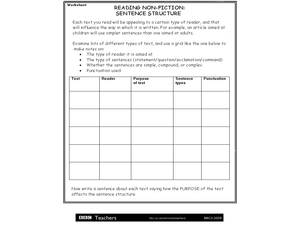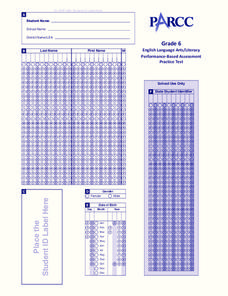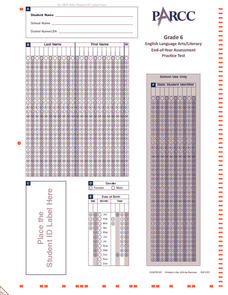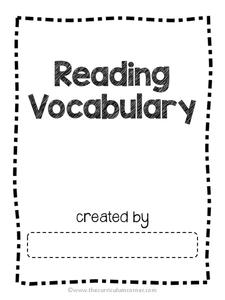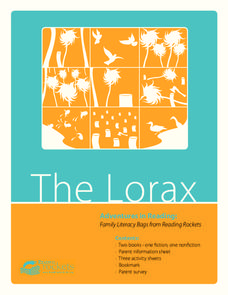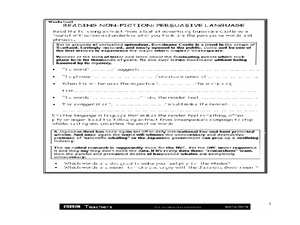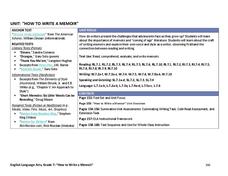Curated OER
Compare and Contrast Nonfiction Texts
Explore nonfiction writing by comparing and contrasting two different texts. After reading two nonfiction books, articles, or magazines, students utilize a graphic organizer to record their similarities and differences. They answer study...
Hood River County School District
Text Structure: Features and Organization
Teach learners how to interact with both fiction and non-fiction text with a packet of activities and worksheets. After looking over text structure and the difference in text features between different types of writing, readers analyze...
Curated OER
Reading Non-Fiction: Sentence Structure
Use this worksheet to help make explicit the connection between sentence structure, audience, and author's purpose. Readers track and find patterns in sentence structure in various nonfiction texts, and connect it to the purpose of the...
Fun in First
Help Your Child Become a Better Reader
Ensure that your learners can read both fiction and nonfiction texts with ease! This resource includes questions that individuals can ask themselves while reading either type of text to help learners comprehend the text, make...
Curated OER
Review of Literary Devices
Sixth graders review literary devices. They use both fiction and nonfiction texts to review metaphor, simile, alliteration, imagery, symbolism and personification. This instructional activity has a scripted guide for the teacher to follow.
Curated OER
Determining Author's Point of View: The Sneeches
Determine the author's point of view in a text. Young readers read Dr. Seuss' The Sneeches and identify the author's purpose in the story. They identify persuasive techniques in writing, asking and answering questions to better...
Curated OER
Making a Non-Fiction Big Book
Writing a non-fiction big book can help students learn about research techniques, note taking, and other skills.
Curated OER
Historical Agency in History Book Sets (HBS)
Study historical events by combining the study of historical fiction and non-fiction. Learners read about true past events in historical fiction novels and then research non-fiction accounts of the same events. What are some differences...
Curated OER
Performance-Based Assessment Practice Test (Grade 6 ELA/Literacy)
Keep an eye on the growth of your sixth graders' reading and writing skills with the help of this practice Common Core assessment. Working their way through the six included fiction and nonfiction reading passages, learners answer a...
Curated OER
The Purpose and Power of Persuasion
Examine the power of persuasion and have learners consider how it influences events in their own lives. After reading and analyzing informational texts to understand the author's purpose, class members take a written test and craft a...
Curated OER
End-of-Year Practice Test (Grade 6 ELA/Literacy)
With the end of the year quickly approaching it's time to find out exactly how much your sixth graders have learned. Specifically designed for the Common Core ELA standards, this practice test gives students five reading passages,...
Curriculum Corner
Academic Reading Vocabulary
From A to Z, learners define, draw, and find examples of specific reading focus skills in an alphabetized reading vocabulary packet. Words include dialogue, theme, text structure, genre, paraphrase, and many more.
PBS
Reading Adventure Pack: The Lorax
Accompany a reading of The Lorax by Dr. Seuss and Tell Me, Tree by Gail Gibbons with an activity packet designed to bring awareness to nature, specifically trees. Scholars take to the outside, draw lines to create trees reminiscent of...
Avi Writer
Crispin: The End of Time
Crispin: the End of Time is the core text for this teaching guide, a valuable resource for those who use Avi's trilogy as whole-class reading, in book circles, or as independent reading.
Louisiana Department of Education
Hatchet
Accompany a novel study of Hatchet by Gary Paulson with a unit consisting of 16 lessons focused on physical and emotional survival. Reading the story along with a variety of informational texts, scholars compare and contrast reading...
Curated OER
Reading Non-Fiction: Persuasive Language
In this persuasive text activity, students read an excerpt from an advertising leaflet and identify the persuasive words and phrases used in the text. Students then read the text about a Greenpeace campaign to identify emotive language.
Curated OER
Phineas Gage: Concept Analysis
Prepare for teaching Phineas Gage: A Gruesome but True Story About Brain Science with this written analysis of the book. The analysis includes a summary, considerations for teachers, project ideas, and a list of additional resources that...
Curated OER
Introducing Working Animals
Students identify ways humans and animals work together. In this animal welfare lesson, students read the text Hanni and Beth: Safe and Sound and define the term "working animals." Students investigate working animals by visiting various...
Louisiana Department of Education
How to Write a Memoir
Who are we and what shapes our identities? Seventh graders work to answer this question as they learn how to write a memoir. Full of non-print resources and supplemental texts that range from fiction to non-fiction, scholars write their...
Student Handouts
Why Does an Author Write?
To get to the heart of a writer's purpose, just remember to have some PIE (Persuade, Inform, or Entertain)! And appropriately, here is a PIE chart that leaves room for pupils to identify each letter of the acronym and any other ideas or...
Curated OER
Pre-writing activities for improving students' connections to literature
Learners, while reading a novel together in class, jot in their journals any connections to their own lives they can make between the text and self, text to text or text to the world. Various themes are connected to open more doors to...
Curated OER
Identifying the Theme in a Story
Students recognize Theme through the use of simple, short stories. Using Pro Quest, students begin by researching the literary element, theme, and how it can be identified. They then identify the themes in Aesop's Fables and other short...
Curated OER
Understanding Genres
Young scholars identify genres of literature. In this literature instructional activity, young scholars read definitions of the various genres. Young scholars choose books and list clues in the texts that help them identify the...
Curated OER
Heartsongs Poetry by Mattie Stepanek
Use Mattie Stepanek’s Heartsongs book of poetry to inspire young poets to write about their own lives, experiences, and feelings. After reading the introduction to Mattie’s book, in which he talks about himself and his reasons for...




